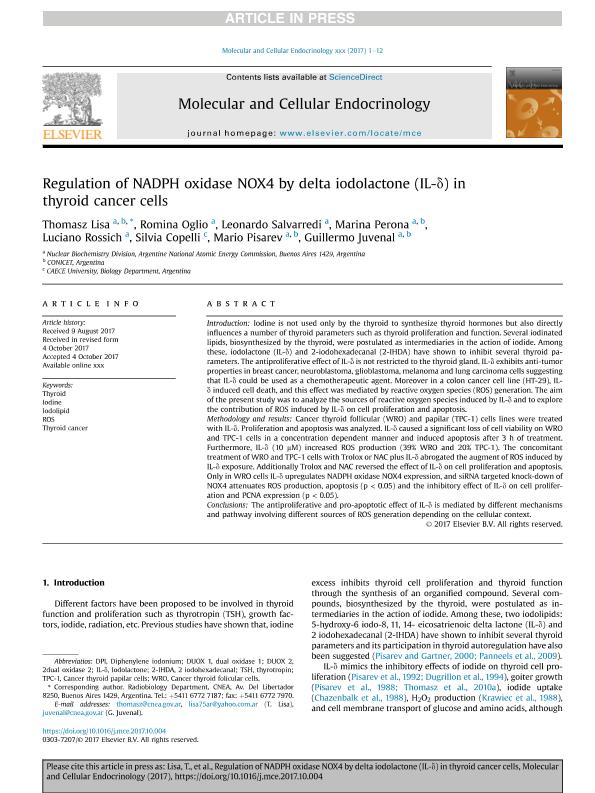Artículo
Regulation of NADPH oxidase NOX4 by delta iodolactone (IL-δ) in thyroid cancer cells
Thomasz, Lisa ; Oglio, Andrea Romina
; Oglio, Andrea Romina ; Salvarredi, Leonardo Andres
; Salvarredi, Leonardo Andres ; Perona, Marina
; Perona, Marina ; Rossich, Luciano Esteban
; Rossich, Luciano Esteban ; Copelli, Silvia Beatriz; Pisarev, Mario Alberto
; Copelli, Silvia Beatriz; Pisarev, Mario Alberto ; Juvenal, Guillermo Juan
; Juvenal, Guillermo Juan
 ; Oglio, Andrea Romina
; Oglio, Andrea Romina ; Salvarredi, Leonardo Andres
; Salvarredi, Leonardo Andres ; Perona, Marina
; Perona, Marina ; Rossich, Luciano Esteban
; Rossich, Luciano Esteban ; Copelli, Silvia Beatriz; Pisarev, Mario Alberto
; Copelli, Silvia Beatriz; Pisarev, Mario Alberto ; Juvenal, Guillermo Juan
; Juvenal, Guillermo Juan
Fecha de publicación:
10/2017
Editorial:
Elsevier Ireland
Revista:
Molecular and Cellular Endocrinology
ISSN:
0303-7207
Idioma:
Inglés
Tipo de recurso:
Artículo publicado
Clasificación temática:
Resumen
Introduction: Iodine is not used only by the thyroid to synthesize thyroid hormones but also directly influences a number of thyroid parameters such as thyroid proliferation and function. Several iodinated lipids, biosynthesized by the thyroid, were postulated as intermediaries in the action of iodide. Among these, iodolactone (IL-δ) and 2-iodohexadecanal (2-IHDA) have shown to inhibit several thyroid parameters. The antiproliferative effect of IL-δ is not restricted to the thyroid gland. IL-δ exhibits anti-tumor properties in breast cancer, neuroblastoma, glioblastoma, melanoma and lung carcinoma cells suggesting that IL-δ could be used as a chemotherapeutic agent. Moreover in a colon cancer cell line (HT-29), IL-δ induced cell death, and this effect was mediated by reactive oxygen species (ROS) generation. The aim of the present study was to analyze the sources of reactive oxygen species induced by IL-δ and to explore the contribution of ROS induced by IL-δ on cell proliferation and apoptosis. Methodology and results: Cancer thyroid follicular (WRO) and papilar (TPC-1) cells lines were treated with IL-δ. Proliferation and apoptosis was analyzed. IL-δ caused a significant loss of cell viability on WRO and TPC-1 cells in a concentration dependent manner and induced apoptosis after 3 h of treatment. Furthermore, IL-δ (10 μM) increased ROS production (39% WRO and 20% TPC-1). The concomitant treatment of WRO and TPC-1 cells with Trolox or NAC plus IL-δ abrogated the augment of ROS induced by IL-δ exposure. Additionally Trolox and NAC reversed the effect of IL-δ on cell proliferation and apoptosis. Only in WRO cells IL-δ upregulates NADPH oxidase NOX4 expression, and siRNA targeted knock-down of NOX4 attenuates ROS production, apoptosis (p < 0.05) and the inhibitory effect of IL-δ on cell proliferation and PCNA expression (p < 0.05). Conclusions: The antiproliferative and pro-apoptotic effect of IL-δ is mediated by different mechanisms and pathway involving different sources of ROS generation depending on the cellular context.
Palabras clave:
Iodine
,
Iodolipid
,
Ros
,
Thyroid
,
Thyroid Cancer
Archivos asociados
Licencia
Identificadores
Colecciones
Articulos(SEDE CENTRAL)
Articulos de SEDE CENTRAL
Articulos de SEDE CENTRAL
Citación
Thomasz, Lisa; Oglio, Andrea Romina; Salvarredi, Leonardo Andres; Perona, Marina; Rossich, Luciano Esteban; et al.; Regulation of NADPH oxidase NOX4 by delta iodolactone (IL-δ) in thyroid cancer cells; Elsevier Ireland; Molecular and Cellular Endocrinology; 10-2017; 1-12
Compartir
Altmétricas



